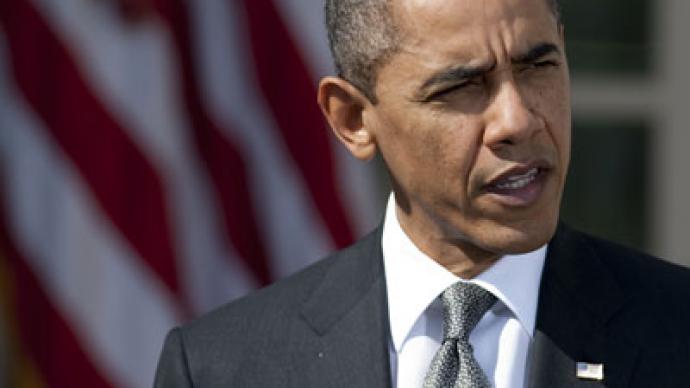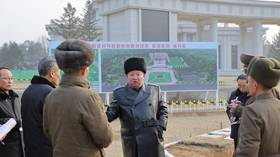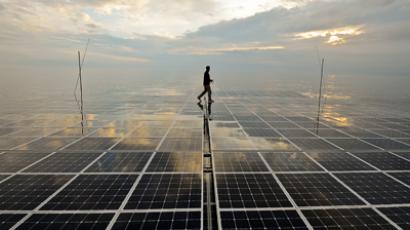China blowback: Chinese co. sues Obama over 'state security' wind farm ban

Chinese-owned Ralls Corporation is suing US President Barack Obama for shutting down their wind farm project near a naval air base in Oregon. Obama cited national security concerns, but the company claims the order was unconstitutional.
Obama acted in "an unlawful and unauthorized manner" in issuing the order without providing "any evidence or reasoned explanation" for his decision, Ralls corporations said in an amended complaint filed on Monday in Washington DC.The complaint called the Government seizure of the property “unconstitutional” and stated they “violated Ralls’s constitutional right to equal protection.”Last week, Obama ordered Ralls Corporation to liquidate its holdings in its wind farm projects near a naval base used to test drones and other experimental aircraft in Oregon. The US President justified the decision through a rarely-used authority provided to his office by the Committee on Foreign Investments in the United States (CFIUS), citing national security concerns for his decision. “There is credible evidence that leads me to believe" that Ralls "might take action that threatens to impair the national security of the United States," Obama said, without elaborating further.Ralls purchased the four wind farm sites in March 2012, with only one of them situated within the naval base’s restricted airspace. However, the executive order from the White House has ordered Ralls Corporation to divest itself of all four sites.It was the first time in 22 years a US president used CFIUS authority to order a foreign company to abandon an American investment. The last time was in 1990, when President George H. W. Bush voided the sale of Seattle-based MAMCO Manufacturing. That prohibited sale was also to a Chinese agency.Ralls faces an uphill battle if they expect to win the lawsuit. "It's a very, very difficult case," said Ivan Schlager, a partner with Skadden, Arps, Slate, Meagher & Flom, a law firm that handles CFIUS cases."The statute was crafted to give the president a great deal of discretion and authority to act to protect the national security interests of the United States,” he said, Reuters reports.Foreign companies are encouraged to allow CFIUS to review their planned acquisitions in the US, but even if they do not, CFIUS still has the authority to intervene. “The project poses no national security threat whatsoever, and the President's order offers no explanation otherwise,” Ralls’ legal counsel Tim Xia said in a statement on Friday. “The president's order is without justification, as scores of other wind turbines already operate in the area where Ralls's project is located." The Chinese company has until December 27 to divest itself of all its holdings in the four wind farm projects."Ralls continues to show its profound faith in transparency and due process, and seeks only fair treatment under the law and the Constitution," said Xia.
Trade winds
Ralls Corporation acquired the four wind turbine sites in March of 2012, and began construction in an effort to “provide a means for the demonstration of Sany turbines as superior in quality and reliability to competitor products,” according to the amended complaint filed in Washington. By the July 25 CFIUS order to cease operations and divest its holdings, Ralls had already completed foundation construction at two of the four wind farm sites, with construction already underway at a third. All the foundations that were constructed were built to fit Sany turbines.Currently, Ralls has been forbidden to remove its materials from the site, is not allowed access to the property, and must find a CFIUS-approved buyer. The move comes at a risky time for US-China trade relations, and also during the run-up to the US presidential election in November. Obama’s opponents have criticized him as being soft on China, and the order could be a way for Obama to deflect those charges by appearing tough on China in a one-time decision, without setting a precedent that could damage trade relations.“The president’s action demonstrates the administration’s commitment to protecting national security while maintaining the United States’ longstanding policy on open investment,” the US Treasury Department said in a statement following the September 28 order. “The president’s decision is specific to this transaction and is not a precedent with regard to any other foreign direct investment from China or any other country.”While the Treasury Department claimed in a statement after the order that “The wind farm sites are all within or in the vicinity of restricted airspace,” Ralls took issue with the broad statement. It clearly illustrates in its complaint that only one of the four wind farm sites is in the restricted airspace of the naval base, and that all four had previously received approval from the Federal Aviation Administration (FAA), along with several other wind farms in the immediate vicinity.“Ralls emphatically denies that its acquisition of the Project Companies was intended to or will have or raise any risks or threats regarding the national security of the United States, and it denies that any credible evidence of such intent or effect exists,” the amended complaint reads. However, the question remains as to whether or not the president is required to divulge information concerning national security to Ralls or the public. A spokeswoman for the US Treasury said she believed the lawsuit has no merit, and the administration is prepared to defend its decision, according to a Reuters report.













